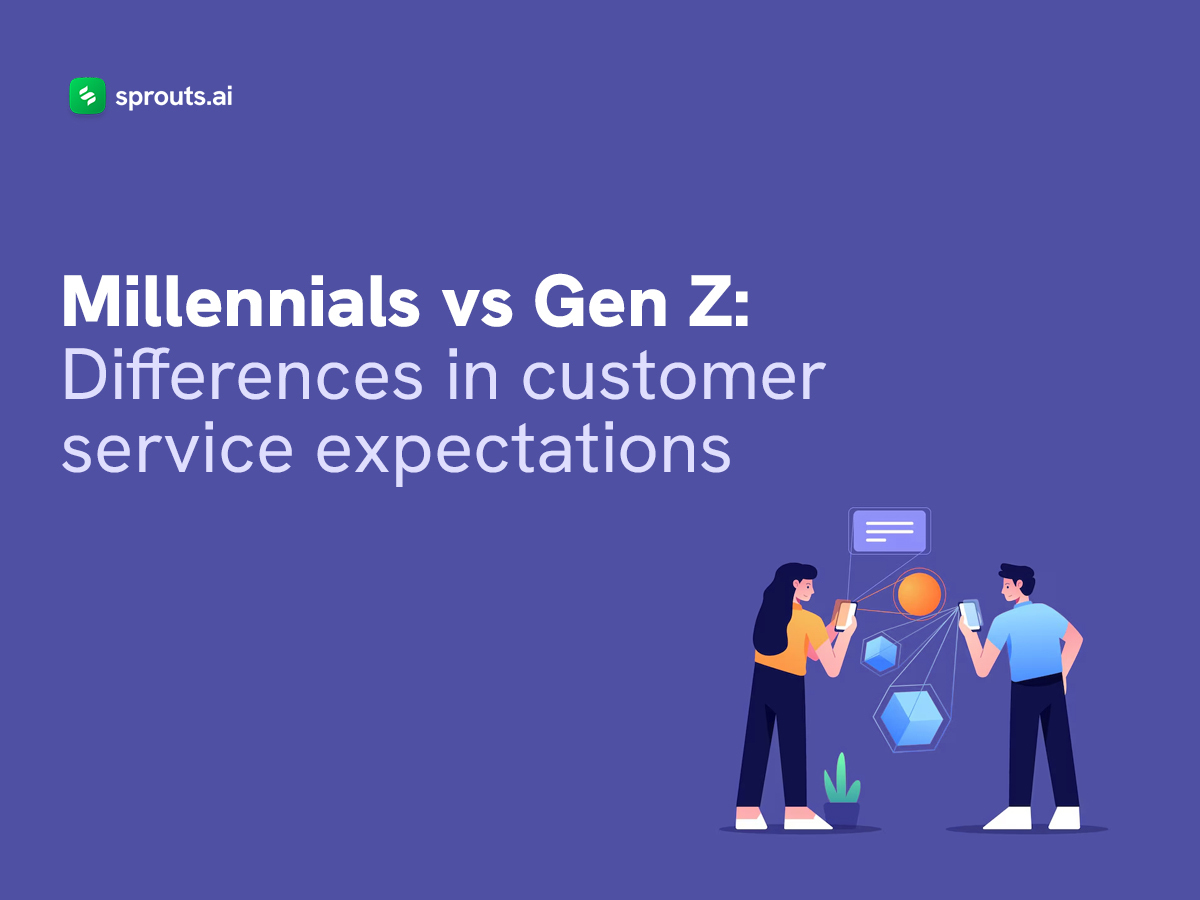Want to know the secret to amazing customer service? It’s all about knowing your audience. Different generations have different needs, and that’s something businesses can’t ignore. Millennials and Gen Zs present a fascinating contrast, highlighting how two seemingly similar generations can have markedly different preferences and behaviors. As companies aim to cater to a diverse customer base, it’s essential to grasp the difference between Millennials and Generation Z in terms of customer support channels, communication styles, and service expectations.
Characteristics of Millennials and Gen Z
Before understanding the customer service expectations, let’s outline the characteristics of Gen Z and Millennials. Millennials, also known as Generation Y, were born between 1981 and 1996. This cohort grew up during the internet revolution and witnessed the rise of social media. They value experiences, seek authenticity, and are often characterized by their tech-savviness and adaptability.
On the other hand, Generation Z, or Gen Z, encompasses those born from 1997 onwards. This generation is the first to grow up with smartphones and high-speed internet as a given. They are digital natives, highly adept at using technology, and have shorter attention spans due to constant exposure to rapid information.
Customer Support Channels
One significant difference between Millennials and Generation Z lies in their preferred customer support channels. Millennials, having experienced the transition from traditional to digital communication, are comfortable using a variety of channels, including phone calls, emails, and social media. They appreciate personalized interactions and often seek human touchpoints in their customer service experiences.
Gen Z leans heavily towards digital and self-service options. They favor chatbots, AI-driven support, and instant messaging. Their preference for quick and efficient solutions aligns with their fast-paced, on-demand lifestyle. Understanding these preferences is key for businesses aiming to effectively engage Gen Z and Millennials.
Gen Z and Millennials Expectations
When it comes to Gen Z and Millennials expectations, several key differences emerge. Millennials expect a balance of digital and human interaction. They appreciate being able to speak to a real person when necessary but also value the convenience of digital support. They are more likely to use social media to voice their concerns and expect timely responses from brands.
Whereas, Gen Z issues are often centered around speed and efficiency. They have little patience for lengthy wait times or complicated processes. This generation expects instant gratification and quick resolutions. Brands must ensure that their digital support channels are optimized for speed and accuracy to meet these expectations.
Personalization and Authenticity
Both generations value personalization, but their approaches differ. Millennials seek authenticity and emotional connections with brands. They appreciate when companies remember their preferences and provide tailored recommendations. This generation responds well to empathetic and personalized customer service interactions.
For Gen Z, personalization goes hand in hand with technology. They expect brands to leverage data to anticipate their needs and offer relevant solutions. AI-driven recommendations, personalized chatbots, and seamless digital experiences are highly valued. Brands that can combine personalization with efficiency will successfully engage Gen Z and Millennials.
Transparency and Trust
Trust is a critical factor for both generations, but how it is earned can differ. Millennials value transparency and ethical practices. They are more likely to support brands that align with their values and demonstrate social responsibility. Clear communication and honest interactions are essential to building trust with this cohort.
For Gen Z, transparency is also crucial, but they have higher expectations for instant information. They prefer brands that provide real-time updates and are transparent about processes. This generation is adept at fact-checking and will quickly lose trust in companies that appear disingenuous or slow to respond.
Self-Service and Automation
Self-service options are increasingly important for both generations, but especially for Gen Z. Millennials appreciate having the option to resolve issues independently but still value the availability of human support when needed. They are comfortable navigating FAQs, knowledge bases, and community forums.
Gen Z issues are often resolved through automation. This generation prefers chatbots, AI-driven solutions, and intuitive interfaces that allow them to find answers quickly. Brands should invest in robust self-service platforms that cater to the efficiency-minded Gen Z while still offering the depth of information that Millennials appreciate.
Communication Styles
The difference between Millennials and Generation Z is also evident in their communication styles. Millennials, while tech-savvy, are more inclined to value face-to-face interactions and detailed communications. They appreciate the opportunity to discuss their concerns and receive thorough explanations.
Gen Zs favor brevity and immediacy. They are comfortable with short, concise messages and often prefer visual content over lengthy texts. Brands should adapt their communication strategies to deliver clear, concise, and visually engaging messages to effectively connect with Gen Z.
Addressing Millennials and Gen Z Issues
To successfully address the unique Millennials issues and Gen Z issues, brands need to tailor their customer service approaches. For Millennials, this means providing a blend of digital and human support, emphasizing transparency, and building trust through authentic interactions.
For Gen Z, brands must prioritize speed, efficiency, and automation. Investing in AI-driven support, optimizing digital channels for quick resolutions, and ensuring real-time updates will meet the high expectations of this generation. Leveraging data to offer personalized experiences will resonate well with both cohorts.
In the debate of Millennials vs Gen Z, it’s clear that both generations have distinct customer service expectations shaped by their unique experiences and characteristics. Understanding the difference between Millennials and Generation Z is crucial for businesses aiming to provide exceptional customer support.
Millennials value a balance of digital and human interaction, personalization, and transparency. They expect brands to align with their values and provide authentic experiences. Gen Z, on the other hand, prioritizes speed, efficiency, and technology-driven solutions. They favor self-service options, instant gratification, and real-time transparency. Investing in technology, emphasizing personalization, and maintaining transparency will ensure that both generations receive the support they expect and deserve. Customer expectations are constantly evolving and staying attuned to the nuances of Millennials vs Gen Z will be the key to building lasting relationships and driving customer satisfaction.

